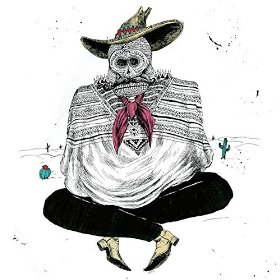This painting, Destruction of the Beast and the False Prophet, has always drawn me in: the high drama, the fanaticism, the eeriness of the beasts. Painted by Benjamin West in 1804, it sits somewhere between neoclassical and Romanticism, a transitional piece. Classical/Biblical in subject matter and composition, but Romantic in its emotional and psychological content.
The protagonist looks possessed. An Anglo-Saxon messiah clothed in Greco-Roman armor, riding an equally zealous horse. Our “hero” and his fierce and physically beautiful army sweep in to obliterate medieval-looking beasts and idolators.

Detail of a beastThe soldiers are bathed in an epiphanous light, which drives away the menacing storm and all the symbolic darkness around it. I get a fascist vibe from this painting—European cultural and physical perfection ousting the ugly, evil other. The civilians in the foreground seem shell-shocked but reach out pleadingly, hailing the liberators as saviors.
The soldiers are bathed in an epiphanous light, which drives away the menacing storm and all the symbolic darkness around it. I get a fascist vibe from this painting—European cultural and physical perfection ousting the ugly, evil other. The civilians in the foreground seem shell-shocked but reach out pleadingly, hailing the liberators as saviors.
Is it a celebration of Enlightenment rationality ushering out provincial superstition? Is it simply an homage to Christianity’s unquestioned international ascendancy? Could Benjamin West have been commenting on the recent French Revolution and its victory of liberté, égalité, fraternité? Not likely, since Britain’s King George III commissioned West to create an epic-scale, multi-painting religious tribute at Windsor Castle—for which this composition may have been intended—that never was completed because of the king’s descent into profound mental illness.
Whatever the intent of the creation, I think this painting inadvertently celebrates European command over the earth. A world it was increasingly colonizing as part of a sense of entitlement, duty, and greed fueled by a proliferation of science and religion that served to justify its endeavor.
 Naubinway, Adam Levy’s new solo album, is released October 23. Buy the CD on your next visit to the Minneapolis Institute of Art—it’s now available in the Store at Mia.
Naubinway, Adam Levy’s new solo album, is released October 23. Buy the CD on your next visit to the Minneapolis Institute of Art—it’s now available in the Store at Mia.
Adam Levy has been the lead singer-songwriter for The Honeydogs, based in Minneapolis, for the past two decades. His musically expansive songwriting for various projects, said to capture “the zeitgeist of our time” by Paste magazine, has drawn on styles as diverse as American roots, psychedelia, world, soul, jazz, children’s, and classical music. His lyrics reflect his years in social work, commitment to social justice, and lifelong interest in history, culture, and politics. In 2012, Levy lost his son, Daniel (a remarkable visual artist), to suicide. Naubinway explores his son’s lengthy struggle with mental illness, his death, and the grief of his family. Levy is now touring and speaking around the country to help reduce suicides and the stigma of mental illness.
Art Inspires brings Minnesota authors into Mia’s galleries: poems, essays, and stories inspired by art in the collection. Read them all here.

